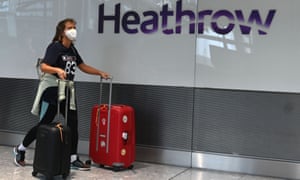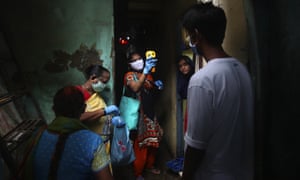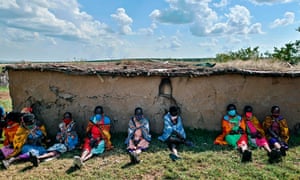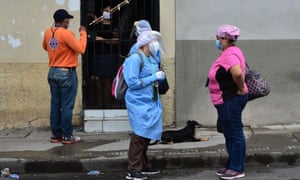In the UK, Heathrow’s passenger numbers were down 95% year-on-year in June, with 350,000 people travelling through the airport.
Its North America and Africa markets reported the biggest declines, according to latest figures.



Passengers wearing a face mask or covering due to the Covid-19 pandemic, arrive at Heathrow airport Photograph: Daniel Leal-Olivas/AFP/Getty Images
Across all destinations, the number of flights was down 82% as demand for travel remained low due to the coronavirus pandemic. Demand for inbound travel was “immediately” hit when the UK government’s quarantine policy came into force on 8 June.
Total passenger numbers for the first half of the year were 60% down on the same period in 2019.
Heathrow chief executive John Holland-Kaye told PA Media: “Travel corridors were a great first step and now we need to go further to protect jobs and kick-start the economy, by allowing healthy passengers to travel freely between the UK and the rest of the world.
“We’re ready to pilot a testing system on arrival for passengers from ‘red’ countries as an alternative to quarantine, but even better would be to test passengers before they get on a plane.
“This requires a common international standard for testing, which the UK government could take a global lead in setting up.”
Updated
India has reported a surge in unsafe abortion during the pandemic. Low priority for reproductive health during lockdown has left millions unable to access contraception or safe terminations.
Updated
Amrit Dhillon
The place that seemed like the last in the world capable of containing the virus – Dharavi slum in Mumbai – has been hailed as a success story by the WHO director general, Tedros Adhanom Ghebreyesus, writes Amrit Dhillon in New Delhi.
Speaking recently about countries that had done well in the pandemic, Dr Ghebreyesus included Dharavi as an example of how, even where the outbreak was intense, it could be brought under control.
“Even in Dharavi, a densely packed area in Mumbai, a strong focus on community engagement and the basics of testing, tracing, isolating and treating all those that are sick is key to breaking the chains of transmission and suppressing the virus,” he said.
The largest slum in Asia at one point looked as though it might become a charnel house. A million people live in a 2.5-kilometre area. Its population density offers perfect conditions for the virus to rip through. Infections rose inexorably.
But last week, the slum started reporting a single-digit rise in Covid-19 cases, while in the rest of Mumbai, the worst affected city in India, the spread showed no sign of ebbing. On Sunday, only five positive cases were recorded.



A health worker screens people for COVID-19 symptoms at Dharavi, Photograph: Rafiq Maqbool/AP
Experts say a combination of measures flattened the curve. A strict lockdown was enforced. Although this caused great hardship and loss of income, residents cooperated. They voluntarily closed tiny shops or tobacco booths where people might have congregated.
The alleys and lanes were constantly sanitised. Health workers, doctors and nurses were present 24/7 to screen and test. Masks and sanitisers were freely provided. Since home quarantine was impossible in such congested living conditions, nearby hostels, schools and stadiums were turned into quarantine centres.
Fever clinics were set up so that residents could be screened and cases detected early, before they could infect others, a measure that proved faster than testing. Community kitchens provided free meals as no one was able to go out and earn a living.
Dharavi’s total number of cases stands at around 2,400. The city authorities believe it can be a model for Indian cities, including the capital New Delhi, struggling to stop new infections.
Updated
Here’s a handy explainer on the restrictions in Australia within Victoria and the border closures with NSW and other states.
The Guardian
(@guardian)Australia’s Covid-19 lockdown rules and coronavirus restrictions explained: how far can I travel, and can I have people over? https://t.co/tFptBcUP2t
July 13, 2020



Ian Sample
Heart scans of coronavirus patients in hospital have revealed a range of abnormalities that can disrupt the ability to pump blood and in severe cases lead to a life-threatening failure in the organ.
Doctors at Edinburgh University examined ultrasound scans known as echocardiograms from more than 1,200 patients in 69 countries and found heart problems in 55%, with one in seven exhibiting signs of “severe abnormalities”.
The scans found damage to the ventricles – the two main chambers of the heart – in more than a third of the patients, while 3% had experienced heart attacks and a further 3% had inflamed heart tissue. The majority had no known heart disease before the scans were done.
Bookings at Kenya’s wildlife reserves have plummeted as a result of the pandemic.
According to the tourism ministry, the sector has lost $750m this year – roughly half of the total revenue in 2019.
In places such as the Maasai Mara, local people are facing economic disaster with cancellations from crucial markets such as China, Europe and the US.
“We were fully booked in June but now we have zero bookings. Nothing. It’s terrible,” said Jimmy Lemara, 40, the manager of an eco-lodge in the private Ol Kinyei conservancy, told AFP.
Kenya has announced international flights will resume on 1 August, but the high season is already lost.



Cultural performers from the Maasai tribe, wearing cloth masks, in Talek in the Maasai Mara national reserve where their work of performing for visiting tourists has dwindled. Photograph: Tony Karumba/AFP/Getty Images
At Talek, a town at one of the entrances to the Maasai Mara national reserve, local people are hoping for better days soon.
“Since December, work has been extremely low, and now we’re in survival mode hoping to make 150 to 200 shillings ($1.4 to $1.9) a day, to be able to buy a meal,” Ibrahim Sameri, 38, whose small mechanic workshop can generate up to $30 a day in the high season, told AFP.
Nalokiti Sayialel, 45, who normally sells bead necklaces and bracelets to tourists passing through, said:“It’s been three months that I haven’t sold anything.”
Updated
Hi. Caroline Davies here. I am going to be steering the live blog for the next few hours. You can contact me at [email protected]
That’s it from me, Helen Sullivan for today. Thanks for following along – for those of you just joining us, you can catch up on the latest with our global coronavirus report:
Naomi Klein: ‘We must not return to the pre-Covid status quo, only worse’
What kind of world will the coronavirus crisis leave us with? Interviewed by Guardian editor-in-chief Katharine Viner for a Guardian Live event, activist and author Naomi Klein insists that the climate, equality and fairness must be at the heart of the post-pandemic recovery:
So how are we going to live with this thing? Are we going to accept pre-Covid “normal”, only much diminished, without the relationships that sustain us? Are we going to allow our kids to have all of their learning mediated by technology? Or are we going to invest in people?
Instead of pouring all of our money into a Screen New Deal and trying to solve problems in a way that diminishes our quality of life, why do we not go on a teacher-hiring spree? Why do we not have twice as many teachers with half-the-size classrooms and figure out a way to do outdoor education?
There are so many ways we can think about responding to this crisis that do not accept this idea that we have to return to the pre-Covid status quo, only worse, only with more surveillance, more screens and less human contact.
Summary
- The World Health Organization reported a record increase in global coronavirus cases on Sunday, with the total rising by 230,370 in 24 hours. The biggest increases were recorded in the United States, Brazil, India and South Africa.
- The Australian state of New South Wales has recorded 14 new cases of coronavirus in the 24-hours to 8pm last night. Eight of the new cases are connected to a cluster at a clyster at a restaurant and pub, the Crossroads Hotel. They include five people who had attended the hotel and three of their close contacts.Four of those cases had already been reported to the media so the number of cases connected to the cluster has increased to 13.Only four of the new cases were returned travellers in hotel quarantine.
- A 30-year-old patient died after attending a “Covid party”, believing the virus to be a hoax, a Texas medical official has said.
- Two Madagascar lawmakers die with coronavirus. Madagascar President Andry Rajoelina on Sunday said two lawmakers – one member of the senate and one deputy – had died after becoming infected with coronavirus. Eleven other deputies and 14 senators had also tested positive for the virus, Rajoelina said.
- Mexico’s deaths pass Italy’s to become fourth-highest worldwide. Mexico’s coronavirus death toll passed Italy’s on Sunday, AFP reports, becoming the fourth-highest globally, with at least 35,006 fatalities over the course of the pandemic so far. Mexico has 295,268 confirmed cases.Italy has 295,268 cases and 34,954 deaths.
- Philippines reports record new deaths. The Philippines’ health ministry on Monday confirmed 162 new coronavirus deaths, the country’s biggest single-day increase in casualties, as a health ministry official said authorities validated some earlier cases included in the tally.
- Ten million kids ‘may never return to school’ after virus. The coronavirus pandemic has caused an “unprecedented education emergency” with up to 9.7 million children affected by school closures at risk of never going back to class, Save the Children warned Monday.
- Super-rich call for higher taxes on wealthy to pay for Covid-19 recovery. A group of 84 of the world’s richest people have called on governments to permanently increase taxes on them and other members of the wealthy elite to help pay for the economic recovery from the Covid-19 crisis.
- A new report by Oxfam warns that the hunger crisis worsened by the pandemic could potentially kill more people each day than the infection itself, which has claimed more than half a million lives so far.
- The US state of Florida has registered 15,300 new infections on Sunday, the biggest daily increase in recorded coronavirus cases in any US state since the beginning of the pandemic.
- Current hospitalisations in the US state of Texas rose by 327 to a new high of 10,410, a record high for the 14th day in a row.
- South Africa’s president, Cyril Ramaphosa, has reinstated a ban on the sale of alcohol to reduce the volume of trauma patients so that hospitals have more beds to treat Covid-19 patients.
- The Palestinian Authority on Sunday imposed a night-time and weekend curfew on the occupied West Bank for the coming 14 days to try to rein in rising coronavirus numbers.
Updated
Super-rich call for higher taxes on wealthy to pay for Covid-19 recovery



Rupert Neate
A group of 84 of the world’s richest people have called on governments to permanently increase taxes on them and other members of the wealthy elite to help pay for the economic recovery from the Covid-19 crisis.
“As Covid-19 strikes the world, millionaires like us have a critical role to play in healing our world,” the millionaires said in a letter shared with the Guardian. “No, we are not the ones caring for the sick in intensive care wards. We are not driving the ambulances that will bring the ill to hospitals. We are not restocking grocery store shelves or delivering food door to door.
“But we do have money, lots of it. Money that is desperately needed now and will continue to be needed in the years ahead, as our world recovers from this crisis.”
Matilda Boseley
Here’s the full story on the cases in the Australian state of Victoria:
Victoria recorded 177 new Covid-19 cases overnight as a significant aged care cluster emerged and the state government launched an online mental health program for young people.
There are now 1,612 active cases in the state with 72 Victorians in hospital and 17 in intensive care.
While there was a lower number of cases reported on Monday than previous days, chief health officer Prof Brett Sutton said it was too soon to say if Victoria’s lockdowns had successfully reduced infection rates.
“[It’s] clearly lower than the maximum number that we’ve had on any one day … it’s great it’s lower than our peak,” Sutton said.
“But it may not be our peak yet. So I would like to see a week of decreasing numbers before I come and say I have greater confidence about the direction we’re going in.”
A number of clusters increased significantly overnight, including the Menarock Life aged care facility in Essendon, which grew by 15 cases to 26. It is now the largest Victorian aged care cluster ever.
Japan and the United States are sharing information about coronavirus cases at US military bases in Okinawa prefecture, a government spokesman said on Monday, after 62 new cases were confirmed at three bases.
Okinawa prefecture said 39 people at Marine Corps Air Station Futenma, 22 people in Camp Hansen and 1 person in Camp Kinser had tested positive for Covid-19 between 7 July through 12.
“Japan and the US are sharing information about activity history of infected military individuals,” Suga said at a regular news briefing.
Honduras will extend its coronavirus curfew for another week in an effort to tame the coronavirus pandemic, the security ministry said on Sunday.
Honduras first imposed a curfew in March but the government has in recent weeks been talking about slowly reopening businesses to help the economy.



Health personnel of the Permanent Contingency Commission of Honduras in Tegucigalpa, Honduras, on 10 July 2020. Photograph: Orlando Sierra/AFP/Getty Images
Mainland China reported eight new Covid-19 cases as of the end of 12 July, up from seven reported a day earlier, the Chinese national health authority said on Monday.
The National Health Commission said in a statement that all of the new cases were imported infection involving travellers from overseas, the same as the seven cases a day earlier. The capital city of Beijing reported no new confirmed cases for the seventh consecutive day.
The Commission also reported six new asymptomatic patients, those who are infected with the coronavirus but have no symptoms, compared with five a day earlier. China does not consider such patients as confirmed cases.
Total number of confirmed Covid-19 cases for mainland China now stands at 83,602, while the death toll remained unchanged at 4,634.



Helen Davidson
Hong Kong health authorities are continuing to battle its worst virus outbreak yet. It saw a rise in cases in March as people began returning from overseas, prompting increased social distancing measures and restrictions which had started to ease in recent weeks.
On Sunday another 38 new cases were confirmed, including 30 local transmissions. Of the 30, 13 have an unknown source.



People queue up at a temporary polling station to vote for pro-democracy candidates during unofficial primary elections in Hong Kong on 12 July 2020. Photograph: Chan Long Hei/SOPA Images/REX/Shutterstock
“I think that both the Government and the public may have to tighten up the measures to maintain social distancing and avoid going out as much as possible to try to curb the this epidemic, said Communicable Disease Branch Head Dr Chuang Shuk kwan.
The city state – which shares a border with mainland China – initially drew praise for its success in keeping the outbreak largely contained in the early months.
Now health officials are warning of record high levels of community transmission and a rising reproduction number (how many people one infected person is likely to pass the virus on to).
On Sunday the head of Hong Kong University’s school of medicine, Dr Gabriel Leung, told local media today that the reproductive number of the virus has risen to nearly four.
“Given the high baseline rate and [that] there is no sign of abatement of this trajectory and that real-time reproductive number of three to four, I think that we have now, or we have already entered Hong Kong’s first sustained local outbreak”, Leung said.
Updated

